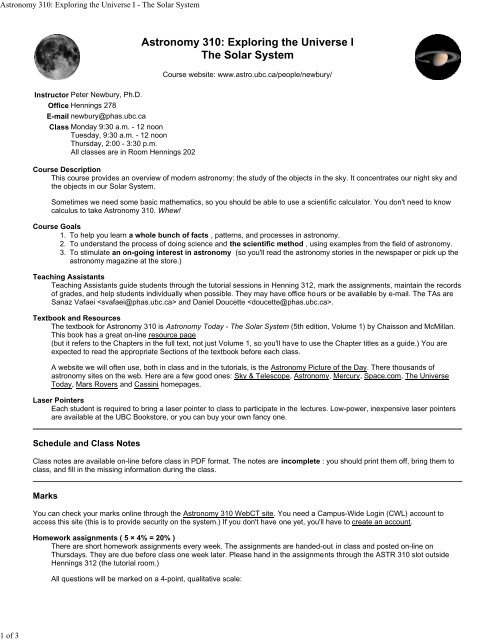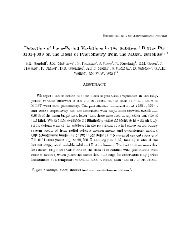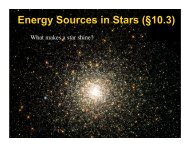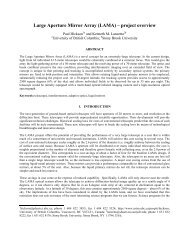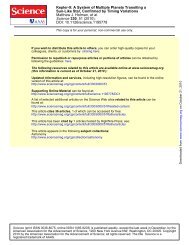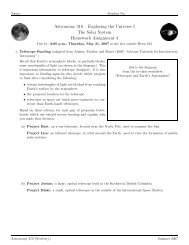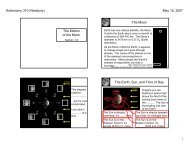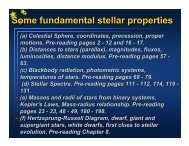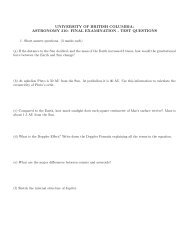Astronomy 310: Exploring the Universe I - The Solar System
Astronomy 310: Exploring the Universe I - The Solar System
Astronomy 310: Exploring the Universe I - The Solar System
Create successful ePaper yourself
Turn your PDF publications into a flip-book with our unique Google optimized e-Paper software.
<strong>Astronomy</strong> <strong>310</strong>: <strong>Exploring</strong> <strong>the</strong> <strong>Universe</strong> I - <strong>The</strong> <strong>Solar</strong> <strong>System</strong><br />
1 of 3<br />
<strong>Astronomy</strong> <strong>310</strong>: <strong>Exploring</strong> <strong>the</strong> <strong>Universe</strong> I<br />
<strong>The</strong> <strong>Solar</strong> <strong>System</strong><br />
Course website: www.astro.ubc.ca/people/newbury/<br />
Instructor Peter Newbury, Ph.D.<br />
Office Hennings 278<br />
E-mail newbury@phas.ubc.ca<br />
Class Monday 9:30 a.m. - 12 noon<br />
Tuesday, 9:30 a.m. - 12 noon<br />
Thursday, 2:00 - 3:30 p.m.<br />
All classes are in Room Hennings 202<br />
Course Description<br />
This course provides an overview of modern astronomy: <strong>the</strong> study of <strong>the</strong> objects in <strong>the</strong> sky. It concentrates our night sky and<br />
<strong>the</strong> objects in our <strong>Solar</strong> <strong>System</strong>.<br />
Sometimes we need some basic ma<strong>the</strong>matics, so you should be able to use a scientific calculator. You don't need to know<br />
calculus to take <strong>Astronomy</strong> <strong>310</strong>. Whew!<br />
Course Goals<br />
1. To help you learn a whole bunch of facts , patterns, and processes in astronomy.<br />
2. To understand <strong>the</strong> process of doing science and <strong>the</strong> scientific method , using examples from <strong>the</strong> field of astronomy.<br />
3. To stimulate an on-going interest in astronomy (so you'll read <strong>the</strong> astronomy stories in <strong>the</strong> newspaper or pick up <strong>the</strong><br />
astronomy magazine at <strong>the</strong> store.)<br />
Teaching Assistants<br />
Teaching Assistants guide students through <strong>the</strong> tutorial sessions in Henning 312, mark <strong>the</strong> assignments, maintain <strong>the</strong> records<br />
of grades, and help students individually when possible. <strong>The</strong>y may have office hours or be available by e-mail. <strong>The</strong> TAs are<br />
Sanaz Vafaei and Daniel Doucette .<br />
Textbook and Resources<br />
<strong>The</strong> textbook for <strong>Astronomy</strong> <strong>310</strong> is <strong>Astronomy</strong> Today - <strong>The</strong> <strong>Solar</strong> <strong>System</strong> (5th edition, Volume 1) by Chaisson and McMillan.<br />
This book has a great on-line resource page<br />
(but it refers to <strong>the</strong> Chapters in <strong>the</strong> full text, not just Volume 1, so you'll have to use <strong>the</strong> Chapter titles as a guide.) You are<br />
expected to read <strong>the</strong> appropriate Sections of <strong>the</strong> textbook before each class.<br />
A website we will often use, both in class and in <strong>the</strong> tutorials, is <strong>the</strong> <strong>Astronomy</strong> Picture of <strong>the</strong> Day. <strong>The</strong>re thousands of<br />
astronomy sites on <strong>the</strong> web. Here are a few good ones: Sky & Telescope, <strong>Astronomy</strong>, Mercury, Space.com, <strong>The</strong> <strong>Universe</strong><br />
Today, Mars Rovers and Cassini homepages.<br />
Laser Pointers<br />
Each student is required to bring a laser pointer to class to participate in <strong>the</strong> lectures. Low-power, inexpensive laser pointers<br />
are available at <strong>the</strong> UBC Bookstore, or you can buy your own fancy one.<br />
Schedule and Class Notes<br />
Class notes are available on-line before class in PDF format. <strong>The</strong> notes are incomplete : you should print <strong>the</strong>m off, bring <strong>the</strong>m to<br />
class, and fill in <strong>the</strong> missing information during <strong>the</strong> class.<br />
Marks<br />
You can check your marks online through <strong>the</strong> <strong>Astronomy</strong> <strong>310</strong> WebCT site. You need a Campus-Wide Login (CWL) account to<br />
access this site (this is to provide security on <strong>the</strong> system.) If you don't have one yet, you'll have to create an account.<br />
Homework assignments ( 5 × 4% = 20% )<br />
<strong>The</strong>re are short homework assignments every week. <strong>The</strong> assignments are handed-out in class and posted on-line on<br />
Thursdays. <strong>The</strong>y are due before class one week later. Please hand in <strong>the</strong> assignments through <strong>the</strong> ASTR <strong>310</strong> slot outside<br />
Hennings 312 (<strong>the</strong> tutorial room.)<br />
All questions will be marked on a 4-point, qualitative scale:
<strong>Astronomy</strong> <strong>310</strong>: <strong>Exploring</strong> <strong>the</strong> <strong>Universe</strong> I - <strong>The</strong> <strong>Solar</strong> <strong>System</strong><br />
2 of 3<br />
Marks Description<br />
4 Perfect.<br />
3 Oh! So close! Your solution is correct except for a few tiny errors.<br />
2 You've got <strong>the</strong> right idea, but <strong>the</strong>re are some serious mistakes.<br />
1 Well, at least you tried.<br />
0 No attempt was made<br />
Many students find it helpful to work toge<strong>the</strong>r with o<strong>the</strong>rs. However, you must hand in your own assignment .<br />
Assignments which show signs of copying will have marks deducted.<br />
Late assignments will not be accepted. However, if you are sick and cannot hand in a homework assignment for a legitimate<br />
reason, tell me and I'll make <strong>the</strong> o<strong>the</strong>r homework assignments count for more.<br />
Tutorials ( 5 × 4% = 20% )<br />
<strong>The</strong>re are 5 tutorial sessions worth 4 marks each. Tutorials are held in Hennings 312 every week , starting on Monday, May<br />
7, 2007. <strong>The</strong>se tutorials are intended to stimulate discussion and to increase face-to-face contact with <strong>the</strong> TAs and o<strong>the</strong>r<br />
astronomy students. Like <strong>the</strong> Homework assignments, tutorials are marked on a 4-point, qualitative scale:<br />
Marks Description<br />
4 You completed and understood <strong>the</strong> activity<br />
3 Oh! So close! You just missed a few, small points.<br />
2 You've got <strong>the</strong> right idea, but <strong>the</strong>re are some serious mistakes.<br />
1 Well, at least you attended.<br />
0 No attendance or attempt at <strong>the</strong> activity.<br />
To receive marks, you must attend <strong>the</strong> tutorial section you registered in . If you have a valid reason why you cannot<br />
attend your tutorial section one week, tell me or your Teaching Assistant ahead of time to find out about switching tutorials. If<br />
you're sick for a tutorial, tell me and I'll make <strong>the</strong> o<strong>the</strong>r tutorials count for more.<br />
Section Day Time Teaching Assistant<br />
T01 Monday 12:00 noon - 1:00 p.m. Daniel<br />
T02 Tuesday 12 noon - 1:00 p.m. Daniel<br />
T03 Thursday 3:30 - 4:30 p.m. Sanaz<br />
T04 Thursday 12 noon - 1:00 p.m. Sanaz<br />
Midterm Examination ( 10% )<br />
<strong>The</strong>re is a short midterm examination on Thursday, May 24. <strong>The</strong> material covered on <strong>the</strong> midterm will be announced at least<br />
1 weeks before <strong>the</strong> exam.<br />
If you miss <strong>the</strong> midterm for a legitimate reason, tell me and I'll add <strong>the</strong> missing marks to your final exam.<br />
Observing Project ( 10% )<br />
A big part of astronomy is <strong>the</strong> process of collecting images and data. At some point during <strong>the</strong> Term, you will have to take an<br />
astronomical picture and <strong>the</strong>n write a brief report about it. You don't need any specialized equipment o<strong>the</strong>r than a digital<br />
camera (or <strong>the</strong> camera on your cell phone) and a pair of binoculars. Of course, if you have access to better equipment, like an<br />
SLR camera and/or a telescope, you'll take a much better picture.<br />
When you've got your picture, insert it into a short document (2 pages max) that describes what is in <strong>the</strong> picture and tells <strong>the</strong><br />
story of how you took it. <strong>The</strong>n e-mail me <strong>the</strong> document (as .doc or .pdf.) Be sure you put your name on your report, too.<br />
Final Examination ( 40% )<br />
<strong>The</strong>re is a final exam shortly after <strong>the</strong> end of Term. <strong>The</strong> time, date, and location of <strong>the</strong> final exam and <strong>the</strong> material covered will<br />
be announced near <strong>the</strong> end of <strong>the</strong> course.<br />
Bonus Marks ( 5% )<br />
If you do extra work outside class, or find something interesting related to <strong>the</strong> course, you may be eligible for bonus marks.<br />
Examples of work worth bonus marks include:<br />
finding relevant newspaper, magazine, journal articles. Include a short summary of <strong>the</strong> article's content.<br />
finding links to relevant websites. Include a short summary of <strong>the</strong> link's content.
<strong>Astronomy</strong> <strong>310</strong>: <strong>Exploring</strong> <strong>the</strong> <strong>Universe</strong> I - <strong>The</strong> <strong>Solar</strong> <strong>System</strong><br />
3 of 3<br />
essays, short "term papers"<br />
"non-science" works, like poetry or artwork that is relevant to <strong>the</strong> course<br />
If you're not sure if something is good enough or has enough relevant astronomical content, ask me.<br />
Corrections to Posted Marks<br />
All marked materials will be returned to you so you can check your mistakes and your marks. It is your responsibility to ensure<br />
<strong>the</strong> marks entered into WebCT are correct. Any changes must be reported to me or your TA within 2 weeks of <strong>the</strong> marks<br />
being posted. No changes will be made after 2 weeks.<br />
Academic Honesty<br />
<strong>The</strong> UBC Academic Calender, Part V (Academic Regulations), states in part,<br />
Academic honesty is essential to <strong>the</strong> continued functioning of <strong>the</strong> University of British Columbia as an institution of<br />
higher learning and research. All UBC students are expected to behave as honest and responsible members of an<br />
academic community. Failure to follow <strong>the</strong> appropriate policies, principles, rules and guidelines of <strong>the</strong> University with<br />
respect to academic honesty may result in disciplinary action.<br />
Students are responsible for informing <strong>the</strong>mselves of <strong>the</strong> guidelines of acceptable and non-acceptable conduct for<br />
graded assignments established by <strong>the</strong>ir instructors for specific courses and of <strong>the</strong> examples of academic misconduct<br />
set out below. Academic misconduct that is subject to disciplinary measures includes, but is not limited to, engaging in,<br />
attempting to engage in, or assisting o<strong>the</strong>rs to engage in <strong>the</strong> following:<br />
Plagiarism occurs where an individual submits or presents <strong>the</strong> oral or written work of ano<strong>the</strong>r person as his or her<br />
own.<br />
Cheating includes, but is not limited to: falsifying any material subject to academic evaluation, including research<br />
data; engaging in unauthorized collaborative work; having in an examination any materials o<strong>the</strong>r than those<br />
permitted by <strong>the</strong> examiner; and using unauthorized means to complete an examination. For example, receiving<br />
unauthorized assistance from a fellow student.<br />
All incidents of suspected academic misconduct must be reported to <strong>the</strong> Dean's Office. <strong>The</strong> Dean's Office may refer any<br />
incident of suspected academic misconduct to <strong>the</strong> President's Advisory Committee on Student Discipline for possible<br />
disciplinary measures by <strong>the</strong> President.<br />
Course Outline<br />
Topics<br />
Chapter<br />
Breaking News in <strong>Astronomy</strong><br />
On-going<br />
Our Night Sky: Charting <strong>the</strong> Heavens 1<br />
<strong>The</strong> History of <strong>Astronomy</strong> 2<br />
Tools of <strong>the</strong> Astronomer<br />
<strong>The</strong> Nature of Light<br />
Spectroscopy<br />
Telescopes<br />
<strong>The</strong> <strong>Solar</strong> <strong>System</strong> 6, 15<br />
Comparative Planetology<br />
Earth<br />
<strong>The</strong> Moon<br />
Mercury<br />
Venus<br />
Mars<br />
Jupiter<br />
Saturn<br />
Uranus and Neptune<br />
Pluto<br />
<strong>Solar</strong> <strong>System</strong> Debris<br />
<strong>The</strong> Sun 16<br />
Life in <strong>the</strong> <strong>Universe</strong> 15, 28<br />
2<br />
3<br />
4<br />
7<br />
8<br />
8<br />
9<br />
10<br />
11<br />
12<br />
13<br />
13<br />
14<br />
Last modified: Thu May 03 09:48:22 2007


